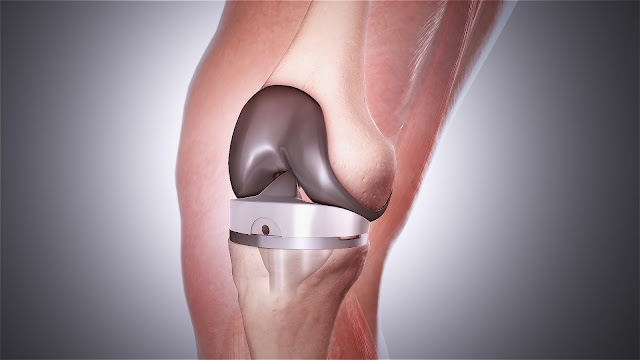Regaining Mobility And Relieving Pain: The Revolution Of Knee Replacement Surgery
 |
| Knee Replacement |
Knee
Replacement surgery, also known as knee
arthroplasty, was first performed in the 1960s. Over the decades, the procedure
has undergone significant advancements in techniques, materials, and
prosthetics. Initially, it was primarily used for elderly patients with severe
arthritis, but its applications have expanded to include younger individuals
with post-traumatic injuries or congenital defects.
Modern knee replacement surgeries can be categorized into two main
types: Total Knee Replacement (TKR) and Partial Knee Replacement (PKR). In TKR,
the entire knee joint is replaced with a prosthetic implant, while in PKR, only
the damaged part of the knee is replaced. These procedures aim to relieve pain,
improve joint function, and enhance the quality of life for patients.
The Global
Knee Replacement Market Is Estimated To Be Valued At US$ 9.4 Billion In
2020 And Is Expected To Exhibit A CAGR
Of 4.1% During The Forecast Period (2020-2027).
Pain Relief: One of the most significant benefits of knee replacement
surgery is the relief of chronic pain. Patients who had been suffering from
severe arthritis or joint damage find immense relief after the procedure,
enabling them to engage in daily activities with ease.
Improved Mobility: Knee replacement surgery allows patients to regain
mobility and flexibility in their knee joints. This enhancement in mobility
contributes to a more active lifestyle, leading to improved cardiovascular
health and overall well-being.
Enhanced Quality of Life: Chronic knee pain can have a substantial impact on a person's quality of life. Knee replacement surgery not only alleviates pain but also restores independence and boosts confidence, promoting mental well-being. Long-lasting Results: With modern advancements in materials and surgical techniques, knee replacement implants can last for several decades, providing long-lasting relief and functionality.
Minimally Invasive Techniques: Surgeons now employ minimally invasive
approaches, involving smaller incisions, to perform knee replacement surgery.
This results in reduced blood loss, faster recovery, and decreased scarring.
Customized Implants: 3D printing technology has enabled the creation of
customized knee implants tailored to fit each patient's unique anatomy. These
personalized implants lead to better outcomes and a more natural feel for the
patient. Robotics in Surgery: Robotics-assisted knee replacement surgeries have
gained traction. Robots assist surgeons in precise alignment and placement of
implants, enhancing the surgery's overall accuracy.
Improved Implant Materials: Modern knee implants are made from
high-quality materials like ceramic, metal alloys, and advanced plastics,
ensuring durability and compatibility with the body.


Comments
Post a Comment